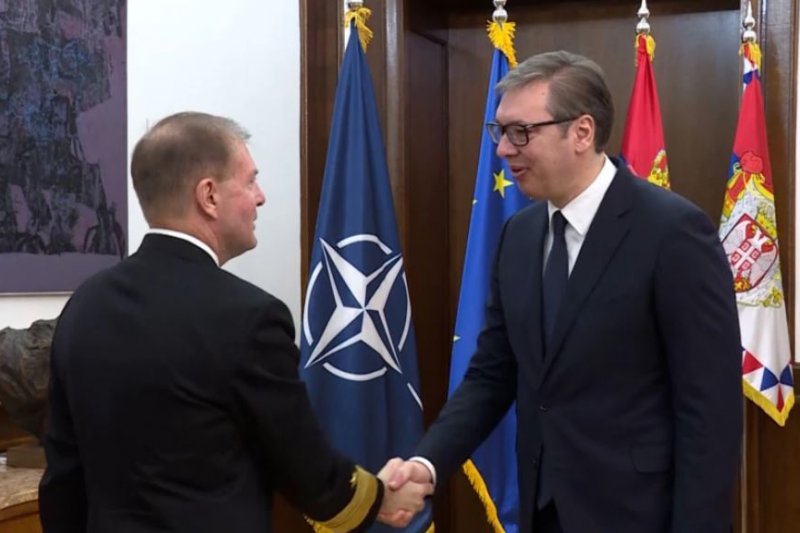We Will Continue Partnership with Serbia; NATO Admiral
Commander of NATO's Joint Forces Command in Naples, Admiral Stuart Munsch, said he will continue the long-term partnership with Serbia, and added that strong relations between the two sides are possible even without Serbia's entry into the military alliance.
In an interview with Beta news agency, the admiral also said that NATO calls on Russia to play a constructive role in the Western Balkans, but said that "unfortunately, it regularly does the exact opposite".
Munch, who will participate this Tuesday in the handing over ceremony of the head of NATO's Military Liaison Office in Belgrade, did not want to comment on Belgrade's attitude towards Moscow, i.e. its refusal to impose sanctions.
"At my level, at the level of coordination of military relations between NATO and Serbia, I think that the war in Ukraine has no negative consequences on our ability to communicate and cooperate. I will not comment on Serbia's political decisions, but we will say that we welcome Serbia's support for two UN General Assembly resolutions condemning Russia's aggression against Ukraine," he said.
Manch, who met separately Tuesday with Serbian President Aleksandar Vucic and Foreign Minister Ivica Dacic, said NATO representatives "regularly see hacking, disinformation, intimidation and other destabilizing activities" by Russia in the Western Balkans.
"Last year, Russia and China worked together at the UN to undermine the international community's intentions to expand the European Union's Altea mission (in Bosnia and Herzegovina). This is just another example of the increasingly harmful influence of Russia and China in the Western Balkans," he added.
Manch said Putin "has made huge strategic mistakes" and added that he "completely underestimated the determination of the Ukrainian people to defend their country, homes and families", as well as the unity of NATO and its partners.
He said that NATO "fully respects the sovereign right of each country to make its own political and security arrangements", and that it calls on Russia to do the same because it is "a fundamental principle of European security to which we are all committed."
"We welcome our close partnership with Serbia. We can have strong relations with our partners, as we have with Austria and Switzerland, without them joining. We fully respect their decision not to join NATO, just as we respect the decisions of others to join us," he said.
He added that NATO believes that a long-term partnership with Serbia, based on political dialogue and practical cooperation, contributes to the strengthening of mutually beneficial relations between the two sides, as well as to the strengthening of stability in the entire region.
Munch said that the NATO Military Liaison Office in Belgrade is "committed to the promotion and expansion" of NATO's partnership with Serbia.
“For example, we have worked together to be better prepared for emergencies such as floods and forest fires. We are also helping Serbia reform its security forces and institutions. NATO trains Serbian soldiers for peacekeeping missions and we have invested millions of euros to help Serbia destroy hundreds of tons of obsolete ammunition," he said.
He said that KFOR is closely monitoring the situation in the north of Kosovo. He added that KFOR is "fully capable and ready to provide a safe environment and freedom of movement for all communities everywhere in Kosovo, in accordance with the mandate based on United Nations Security Council Resolution 1244 by year 1999".
"Since October we have increased the presence, among other things, by increasing the forces, as well as the patrols in the north of Kosovo this week. We expect all actors to be in close coordination with the KFOR mission and refrain from provocative demonstrations of force, in order to preserve the safety of all communities," he said.













